|
FOREWORD
Prepare yourself well; the monotony of reading the following * legend
could only be exceeded by that suffered by those who actually laboured
and existed through the long period covered. Leavened as it was by an
abundance of incidents, many humorous or interesting, and some tragic,
that period of many defeats, closed by a final and brilliant victory,
was little more than an existence for those concerned.
No attempt has
been made to record the history of the campaign nor even to set down a
full and detailed story of this one unit, the latter alone would fill a
large volume, and the supply of time and materials, not to mention
talent preclude such an undertaking.
What has been
accomplished is an accurate recording of the many varied moves of the
unit, with occasional mention of the numerous roles filled, therefore it
is obvious that the book will be of little interest except to members of
the unit, and their friends or relatives who are primarily interested in
the doings of their menfolk. Such being the case, it is hoped that the
limited number of possessors will derive a great deal of amusement in
the future by glancing through it and so be reminded of, after all, not
happy days.
May they not
forget their many good comrades, nor ‘Smeet’ the printer, who
contributed so much to the finished article. Whether or not there will
be a continuance of the story depends on too great a variety of
circumstances for a definite statement to be made in that respect.
* The
“Legend” (no myth) was the brainchild of Hamish McCallum (C.S.M.)
who was ably assisted by Don Smith (The Printer), Bill Davison, Johnny
Watson and many others! It was done during a lull in the Italian
Campaign in Central Italy. When operations resumed, the Company was
fully employed right up to the River Po!! The Company was finally
disbanded, with the Eighth Army, having served on almost every operation
with Eighth Army, from the Army’s creation to its final days! The
“Desert Rats” was a scurrilous name, bestowed by a German lady radio
propagandist! There were only two copies made of the original
“legend” (T.E.F.), the original went to C.S.M. McCallum, and a copy
each to Don Smith and Bill Davison
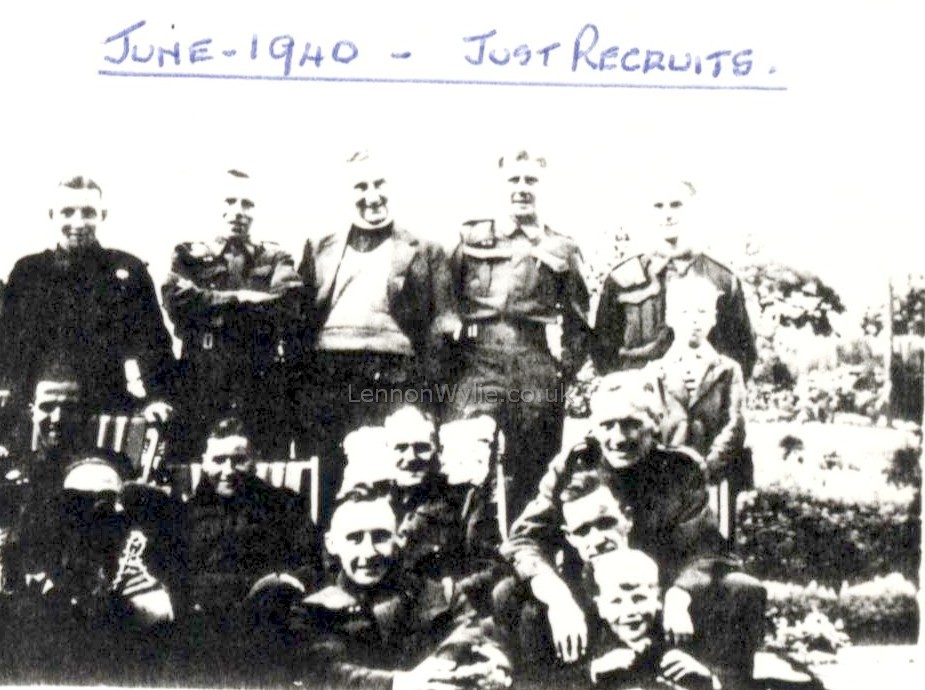
CONTENTS
Chapter Pages
I. Formation
II. Phase I; from October, ’41 to July, ‘42
III. Interlude, and some Army signposts
(throughout)
IV. Phase II; from July, ’42 to May 12th, ’43
V. Truth and T.E.F.
VI. Phase III; from May, ’43 to December, ’43
Illustrations: Snapshots by personnel of the unit.
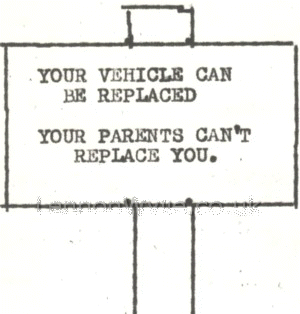
FORMATION
The first of October, 1941, was the day of commencement and was marked
by the arrival of Major J. B. Noon and 2nd Lt. E. D. Greenwood, O.C.
Company and H.Q. Subaltern respectively. The remaining personnel arrived
within the following seven days, and what personnel! “Desert Rats”
and “Blighty Boys”, the former comprised mostly of ‘Victims of the
Big Shovel’ full of bull and bluster, the latter pink and white and
not quite so soft as they looked.
The show now
started in real earnest and a state of organised confusion prevailed.
Ordnance maintained their normal role magnificently, nothing was
available, and the ‘Q’ looked permanently harassed. The vehicles
were available * but the drivers were either going on or coming back
from leave, and of course, there was the usual procession of
courses, schemes, training and inoculations, etc., just to help along,
even a detail down into the Arabian Desert to Akaba, which was piling it
on a bit for a Company in the throes of birth.
However, at the end of the month things had taken shape, blurred,
admittedly, but quickly becoming clearer, of these orders was definitely
mixed ‘we are not nearly ready’ and ‘Let’s get to hell out of
it’ sort of thing, the latter being predominant, not that it made any
difference how anybody felt, go was the order and go we must. There had
never been much doubt about the destination of the Company, and as soon
as the order was received, it became certain, the Western Desert,
the Blue, miles of buff coloured damn all, any name you like will do,
the result will be the same in the end.
• Leave was
given at this time, because of the long sea journey of the “Blighty
Wallahs” – 2 months round the Cape!, and to prepare for a long
period of actual was service!
PHASE
I
We moved out of the Talag and left Shafto's opulent establishments
behind, at day-break on the 31st October, 1941, the start being
considerably enlivened by the sight of a certain Platoon Officer
standing on the cab of his truck gesticulating frantically, with no
apparent result (he doesn't do it now). We arrived at Suez and
loaded the vehicles that day and stayed the night at Ford Agrud.
The cooks got their first chance to do their worst but we all survived
and were present for further punishment next morning before we moved off
for Wadi Natrun, via Cairo.
Surprisingly, when we stopped to refuel at Nena, there wasn't a single Western
Oriental Gentleman ! body to be scraped
off any of the vehicles, not even a smear, of course you couldn't blame
the lads, what with being new at the game and being in convoy they
weren't quite as proficient at the sport as they later became.
Having left the C.S.M. and the 'Q' to hitch-hike as best they might, the
Company rolled merrily on from Nena and parked the night at the
destination for the day. The aforementioned gentlemen (?) arrived
in state on top of a load of petrol, just in time for dinner.
The next day, 2nd November, we continued along that apparently endless
road through Amyria and on to El Daba, where we spent out third night.
The only event of the whole day consisted of louder, longer and more
virulent profanity from the cooks, who had to do their stuff in the dark
- the little darlings !
Mid-day of the third saw us at our destination, about three kilos past
Abu Haggag. H.Q. and W/Shops made camp whilst the Platoons went on
to unload at Mersa Matruh, and tried to explain where 30? of each said
load had leaked to. (The containers were very flimsy, and the
journey Rough!!)
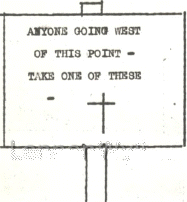
Next morning, the uninitiated observer would have said, without
hesitation, that the R.Q.M. from Tahag had moved with us, lock, stock
and barrel; the initiated would merely have remarked that the
"R.Q.M. had been left behind". Remarking on the quantity
of tent accommodation, the O.C. was met with bland countenances and
plausible explanations of how "this had been found and that was a
buckshee" and "Pinched? No, Sir!" So having had his
worst fears confirmed he promptly went off and forgot them.
At this location we suffered our first fatal casualty, Dvr.
Cunliffe was killed whilst out on D.R. duties and buried at El Daba
Military Cemetery, the circumstances which caused his death remain
a complete mystery.
Air raids were nightly occurrences
and the members of the Officers' Mess took a particularly dim view of
them as the Mess was situated about a hundred yards from the perimeter
of one of our fighter 'dromes, which, in conjunction with the railway
half-a-mile away, comprised one of the main targets in the area.
"C" and "D" Platoons departed. "C"
to get to work on the new Forward Base near Bir Thalats, and
"D" on detachment with 15 C.C.S. Both were perfectly
happy about it; Platoons are usually glad to get on detachment, away
from "H.Q. bull" as they term it, but how smartly they came in
when they want something.
* C.C.S. - Casualty Clearing Station
The Desert Army is no longer Western Desert Force, It is now
"Eighth Army", then unknown. What significance that
name now bears. So the Company can say that it marched with the
"8 A" from the inception of that famous force.
On the 16th November, we left Abu Haggag and proceeded through Matruh
and on by road for another 80 kilos beyond, and then away South into the
desert, to the new location, just a few miles East of the "Desert
Railhead" which had just been completed. Our location was
easily distinguishable - on the map! Sidi Mahmun, an isolated Arab
grave, of which there are only a few thousand and scattered about.
However, we did not get dug in. On the 20th we moved a few miles
nearer D.R. and joined Rear H.Q., Eighth Army, and became domestic
Company to that Formation. The remaining Platoons, "A"
and "B" went on to D.R. which was at Misheifa and formed
another detachment under Capt. R.J.S. Our new location had a
resounding name - Bir El Hagg Mohamed - said rapidly it sounds like a
very handy cuss-word. In actual fact it is only the name of a
well. There is little essential difference between any of these
desert locations, just a little camel scrub and miles upon miles of
nothing, hardly even a contour on a map, the whole populated by
variegated insects, reptiles, dogs and Western
Oriental Gentlemen !. Some
questions arise out of each. Where did the scorpions, snakes and
beetles, etc. sleep before the advent of the Tommy's bed? Who fed
the dogs and housed them before Tommy himself? What did the Western
Oriental Gentleman ! use for an all
purpose vessel prior to the introduction of the four gallon petrol tin?
The E.F.I., of course, was conspicuous by its absence. I am
sure everyone has seen pictures of their Roadhouses and Canteens.
If so, treasure the memory for that is as near to the real thing as you
are ever likely to get unless you are one of the lucky ones - their
strength is about one percent.
* E.F.I. or N.A.A.F.I. - military canteens

Capt. P. left location during late
November. He had ten days' rations, water and P.O.L. for Gialo
Oasis which lies deep in the desert, South East of Benghazi. The
small Fort there had been taken from the Italians, and was then
garrisoned by some of the 4th India Div. and was used by the L.R.D.G.
as a base from which to operate. The country was terrible for load
carrying transport, much of the convoy's route lay through uncharted
desert, where the vehicles had to plough, and "plough" is the
only word to describe it, through soft, shifting sand. Some of the
vehicles became completely bogged and had to be abandoned, others were
left far behind and often were lost. The L.R.D.G. found one
such group and were fired on by the "lost sheep", fortunately,
there was no casualties and no reprisals were taken. One group of
vehicles was turned back by their commander who had spotted enemy
armoured cars in front, these turned out to be nothing more formidable
than empty four-gallon petrol cans lying on a ridge, left there by some
of the leading groups in the convoy. Spare his blushes! In
spite of everything, however, Gialo was eventually reached. No
bouquets were received for this operation.
* L.R.D.G. - Long Range Desert
group (Commandos)
Meanwhile, the remainder of the Company carried on. Two more of
the lads got one-way tickets, Cpl. Haley, run over one night whilst in
his bivouac - just one of those unfortunate accidents and Dvr. Downing,
who was killed during an air-raid. Air-raids were nightly
occurrences, the Company, once again, being parked on the outskirts of
an aerodrome, which, as usual, was one of Jerry's regular calling
points.
The first Eighth Army push was now on and our ears were at full cock for
"griff". (news) One piece of news we got didn't make for
sound sleep - an enemy armoured column had broken through and was
creating chaos behind our lines. Unfortunately, it was true in
part, a small patrol had got through and had cut up a few Units.
The 'flap' was only a small one, and was soon put right. *though
one corporal was seen dashing to the Sgts' Mess, the 'Q' viewing his
approach with some trepidation. Perhaps he had a guilty
conscience. Then there was the sergeant who was, without fail,
first man in the Mess each night and always bought the first round.
No, he didn't have a private income, but he did wear his steel helmet.
* Cpl. Davison
Tobruk was relieved on the 12th December, and the way was opened for
another move forward.
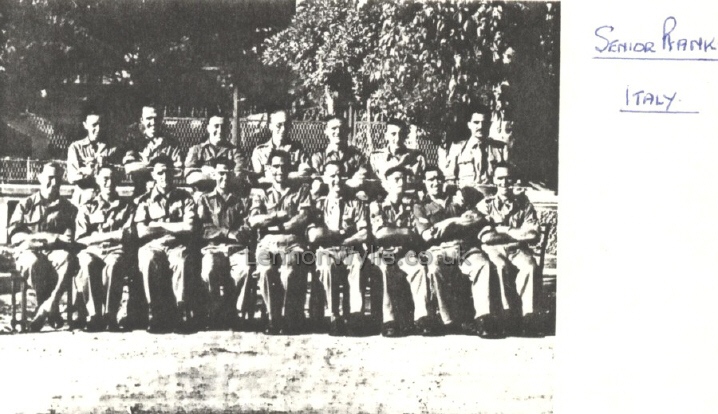
On the 17th December, away we go, Tobruk bound, via Conference Cairn and
Bir Sheferzan (Libyan(, where we halted for the night. On the 18th
we passed through Sidi Rezegh. There was no flag waving, in fact
there was nothing at all, with the exception of derelict tanks and an
odd 'plane. It was just another name on the map. Then down
the escarpment and into Tobruk with just time for the evening meal and a
walk round the camp site. Next day we got settled in - there were
plenty of dug-outs and ready-made holes in the ground for tents. A
vehicle being blown up by a mine let us into a Military Secret, nobody
had told us anyway! The way we had come into the camp area was the
only clear side of the site. The other three sides were bounded by
minefields! Rear H.Q. Eighth Army were between us and the road on
the safe side, they didn't know about it either.
Tobruk was still receiving a nightly and often daily visit from the
Luftwaffe and everyone was tickled to death with the deep dug-they were
occupying - not to mention the fleas. The R.H. detachment had
moved up with us and were down on the coast doing dock details.
It was here that Eighth Army started their drive to collect the "Jerrican"
for use by our Forces, an excellent 4-gallon petrol tin, the origin of
the name is obvious. Also 44-gallon drums were wanted and in the
collection of those we lost, Dvr. Warner who ran over a large tank
mine, and was blown to pieces.
We had an excellent Xmas dinner, bully, biscuits and duff. There
was something else in the dinner - reputedly mutton "Itie"
boot leather or cigars, the difference in composition of the latter two
items appears to be negligible. The E.F.I., of course, carried on
as usual. The saying that the Greek for 'not available' is 'Dados'
is open to dispute, 'NAAFI' must register a very strong claim.
However, everyone had a good time, even the officers, who suffered some
inconvenience from flying bullets - the O.C. achieved a doubtful victory
in a duel with the C.S.M.
Dvrs. Kyles and Dickson were superficially injured when one pf them
kicked a "Red Devil", they were evacuated. L/Sgt.
Warden was injured by a land mine and was sent to hospital. Some
of the heavy ack-ack shells thrown up at Jerry unfortunately came down
again in one piece. They frequently dropped in out area then
exploded - we preferred Jerry - he wasn't such a good shot!
* Red Devil - Italian Hand Grenade (like a child's money box)
The Gialo convoy had been split up a great deal, and parts of it began
to return, all of them the proud possessors of very scruffy clothing and
two or three day beards - they lost the beards, anyway.
The first of these arrivals reported two more deaths, Cpl. Whitelock and
Dvr. Rouse, they were buried at Garabub.
To our disgust Eighth Army was now retreating again, and for a short
time Adv. H.Q. Eighth Army was further back then we were with Rear.
Then we got our orders to scram on the 3rd February, and in some ways we
weren't sorry. It had been damned cold, the sandstorms were a
continual source of irritation. When you add to that the fact that
the water was salt and therefore a good 'brew' (tea) was unknown,
Tobruk was hardly a home from home.
There was no 'flap' about the retreat, everything was organised.
On 4th February we carried out our orders and moved back, past Capuzzo
and a little east of the Italian defences at Sofafi, to a wadi
pleasantly named "Straffers' Wadi" - we hoped not!
It was still as cold as ever and the sandstorms were even worse than in
Tobruk.
However, leave started and everyone started telling everyone else how
they hadn't had more than a couple of days leave in three years, taking
care, of course, that the right person was within earshot. The
C.S.M. and R.S.M. wangled a business (?) trip of course, to Alex and
Cairo, with the O.C.
"A" Platoon was reformed out of the mixed lot which was then
"A" and "B" Platoons. "B" Platoon,
to the utter disgust of the Platoon Commander, was made up afresh from
all the stragglers.
All detachments had been cancelled and we got orders to leave Rear H.Q.,
Eighth Army and take up duty with 1 L. of C. Tpt. Coln., as a transport
Company. This was done on 25th February, and the new camp site a
few miles S.E. of Bir Thalata, was soon fixed up. The whole
Company was then together for the first time in months, one half were
strangers to the other. "D" Platoon came back with an
excellent letter of commendation for their work whilst with the C.C.S. (Casualty
Clearing Station)
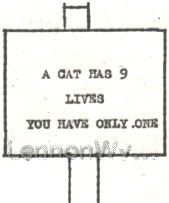
The last stragglers from the Gialo convoy had returned, but that wasn't
the last we were to hear of that job. No, we still hear of it and
each mention of it draws deep groans from the assembled company!
Desert rail-head was once again the scene of operations carrying from
there to Capuzzo.
The Lt. Col. paid us a visit, his first official one as our Formation
Commander, and he took a poor view of the amount of luxury (?) items we
were carrying, so a lot of it had to go. What
"something" remarks this brought forward can easily be
imagined.
We were unaware of the fact, but that was the commencement of 16
months of hard labour for the Company, and our ups and downs were to
be many.
The weather now excellent itself, particularly in the Capuzzo area, the
skies opened and the contents descended continuously for days - result,
vehicles bogged everywhere and the tracks up to Capuzzo became
impassable. In contradiction of the general opinion, one of our
convoys got through and received a left-handed pat on the back, that is,
they had to keep doing it or be asked why.
We expected our new push to commence, and were full of bright hopes for
the future. Preparation had been the catchword for some time - the
extension of the railway to Capuzzo was one sign.
On 17th March, we moved from Thalata to the Capuzzo area and set to,
working from the new rail-head at Capuzzo forward to Tobruk. 1 L.
of C. continued to be our higher formation. The tracks from
Capuzzo to Tobruk were bloody, and probably still are, broken springs
were the constant grey-hair producer, no convoy did the journey without
suffering, and the worst of it was there were practically no new springs
to be had. It was a case of patch up all the time and if a
derelict vehicle was seen, it was certainly a skeleton within 24 hours.
As a matter of fact it wasn't safe to leave a vehicle outside the Camp
area for five minutes, something would go and the longer you were away,
the more you lost. Heath Robinson had nothing on our Workshops
when it came to improvising in that line.
Leave was still open, but was expected to stop any day.
The stocks of material being moved to Tobruk by the Transport Companies
was greater than ever before.
Jerry had diverted his attention from the Misheifa rail-head to the new
one at Capuzzo, but he didn't like the ack-ack, so more often than not
he sprinkled his load around the transport areas in the vicinity.
Deep holes to sleep in were, therefore at a premium in our camp, and
even then one felt that there wasn't a bigger one anywhere and
compressed oneself to the smallest degree. Of course, there was
the old soldier who always stuck a leg out of his bivouac during a raid
- hopefully!
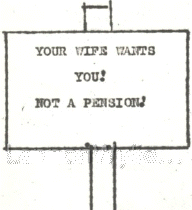
On 15th April, we left Capuzzo and 1 L. of C. and moved up to Tobruk
again, this time for a special job. Of course, we got one of the
best sites in Tobruk - Happy Valley!! Plenty of caves and dug-outs
- walk in and you were carried out! There was no need to touch
anything - the fleas could jump six feet, though even they were not fast
enough to keep up with their Italian comrades. Every damned thing
in that camp was alive with fleas and lice. Jerry's visits were
only secondary considerations to scratching.
The Brighton Beach Leave Camp opened, normal leave having stopped.
The slogan of this camp was: "Nothing to do, all day to do
it," and "Bags of Beer". The lads didn't believe
it, "It isn't possible", said they an didn't go. As it
happened, it was true!
The job was now finished and with a commendation from 83 Sub Area, the
Company moved back to 1 L. of C.
The 2nd May saw us back at Capuzzo, and on the 3rd convoys again
started. Jerry was still a regular visitor and usually strafed the
convoy centre at dawn and dusk in addition to his nightly raids on
Capuzzo. The Sergt' Mess failed to appreciate a 250lb unexploded
bomb which he left a little too near to them. Nobody appreciated
his daisy-cutters - the Butterfly Bomb.
Also on the 3rd, we sent a detachment of three Platoons, "A",
"B" and "D" to Sollum, where they were employed on
local work for Capuzzo rail-head. They had quite a pleasant
holiday (!) by the seaside, and returned to the fold on the 14th.
Tobruk and Strafers' Wadi had, up to now, held all records for
sandstorms, but Capuzzo won the 'belt' - they didn't occur often, but
when they did - whew!! The first intimation was a huge purple
cloud in the distance and that was the signal to anchor every mortal
thing and then anchor the anchor (Kamseen Winds) (Khamsin
Winds)
Bir Hakeim had been fought out and the Company transport Platoons were
rushed up to bring the 4th Indian Div. out of the El Adem box, and were
alternately brought forward and chased back, as the battle fluctuated.
It was a case of continuously standing by, sleeping at the wheel, of
Jerry's planes would let you. One Officer had to go into the box,
and whilst he was inside the Indians closed the gap in the minefield,
which gave him and his driver their first intimation that they might be
called upon to become heroes! However, the Brigadier in charge,
who, incidentally, didn't show by any sign that he knew there was a
battle on, ordered the said officer out of it with orders regarding the
transport, and when our gentleman pointed out that the gap had been
closed, just looked and asked: "What the hell has that got to
do with it?" So the Indians lifted a few mines. The
officer's driver claimed, quite solemnly, that their truck only hit the
highest bumps for the next few miles !
Eventually the Indians had to fight their way out to the nearest point
where it was possible to bring the transport without irreparable loss of
scarce and valuable vehicles. Our vehicles picked up the Indians
who had got through, and made a race for it from enemy A.F.V.S., at the
same time cursing the Jerry airmen who were bombing and strafing as hard
as they could, to Bir Enba via Bir Khieregat, where we stayed the night.
At the same time we changed over from 1 L. of C. to 2 L of C.
Though the battle was going against us, the general opinion was that we
would hold them at Sollum and southwards, where the Egyptian border
runs. Tobruk, we thought, would hold out as before, but alas, we
were to be disillusioned. The Platoons came in after their race
across the 'blue' and immediately went out again, some on detachment
with 550 Company which had been cut up, and the others to work clearing
the Desert Railhead which was only a few miles away. That detail
in itself was ominous.
The whole Company was standing by now, that is, the remaining part of
it, and everyone was on tenterhooks.
13 Corps now decided that it would be a good idea to form a group
Workshop for the use of all Companies in the Corps. It was to be
composed of one Workshops Section from each Company, which shows that
although we were suffering defeat, there was no panic or rout.
Commanders don't try new schemes of this description in a rout.
The idea was that a grouped Workshops would be able to obtain bulk
supplies of heavy assemblies and deal with all heavy repairs much easier
than a Company which was operating and moving all the time, could do for
itself.
When the order came through, the O.C. decided to send his Company H.Q.
with the Workshops Section, and so have the transport side of the
Company free during the coming operations without the burden of H.Q. to
carry.
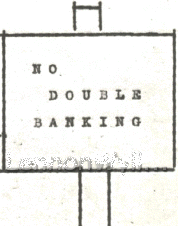
So on the 22nd June, they moved out and joined up with the body of the
group Workshops, and next day moved back to Matruh and then on to Fuka
the following day. Here, the attempt to operate as a grouped
workshops was made, but operational necessity made it temporarily
impossible and the Sections were sent off to rejoin their respective
Units.
Meanwhile the Army was still withdrawing and were coming back very
quickly. Mischiefa, Barrani, and greatest blow of all, both Tobruk
and Matruh had fallen - those so-called impregnable fortresses!
However, order still reigned and there was no panic, though the retreat
was the worst suffered so far, Everything was bring kept well in
hand.
H.Q. rapidly tucked up their skirts and got moving when they found that
all ration dumps and water points west of them had closed down.
The main body of the Company was encamped at El Daba, and on the 27th
June, H.Q. attempted to contact them and join forces, but owing to the
very heavy traffic and the fact that El Daba was being evacuated, this
was prevented and H.Q. had perforce to keep on towards Amyria by the
main road, whilst the main body moved back with 2 L. of C. by the Desert
Route. The latter was still operating and work was no whit easier.
Jerry now held all points West of Fuka and was advancing rapidly and
apparently, irresistibly.
The main road was absolutely packed with transport of every description,
and as far as El Amamein, it was all going the same way - East! El
Daba was the next point of importance to fall and things were looking
very black, but for all that nobody seemed to think that it was all
over, except the Western Oriental
Gentlemen ! who daily became more
insolent. Everywhere could be seen signs of a terrific effort
being made to halt the retreat.
On 1st July, the two parts of the Company joined up at Amyria and
immediately set up camp at Ikingi and 'rested'. No bloody fears!
The enemy being held at El Alamein wasn't enough. Immediate
preparations were being made to knock him all the way back and then some
- it was no part of the British plan to let Jerry use his ready made
British currency in Alex. or Cairo, nor that Musso should ever issue his
medals (also ready made) for the triumphal entry into Alex.
Speculation was rife everywhere as to the next move, there was plenty to
talk about, everyone had his own particular story to tell, or how this
and that happened in the retreat, even H.Q. had their tales of strafing
and moonlight flits. Men who had had their trucks knocked out, one
who stole another under the noses of a Jerry patrol and got away, whilst
tales of long, hard drives and sharp and frequent moves were so common
as to be ordinary. The vehicles - the same old ones - had stood up
to terrific punishment wonderfully well, and were still going strong,
more credit to the makers and the drivers who spent the greater part of
their lives in them.
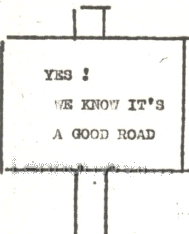
INTERLUDE
Though work never actually ceased between the end of the retreat and the
commencement of preparations for the new push, there were times when it
was possible to get a little relaxation. The Company's location at
Ikingi was roughly an hour's ride by road from Alexandria. Even
so, the Company's location was in the desert. Taking advantage of
the nearness to Alexandria afternoon trips were arranged, so that when
there were a few hours available we could get a taste of civilisation.
We had one other luxury which usually is never appreciated - unlimited
quantities of water were available, at least, they appeared unlimited to
us. The only limit was the number of times the water truck could
make the trip to the water point, but to men who had been rationed to a
maximum of one gallon for all purposes, per day, sometimes
three-quarters of a gallon and occasionally as low as half-a-gallon, two
or three more gallons a dad meant absolute extravagance, particularly
when out of the ration of water must come firstly what is required for
cooking, secondly, the daily wash, and thirdly the washing of clothes,
which when dressed in Khaki-drill is an item in itself.
Pictures and concerts were another type of luxury which most of us has
missed. All the time we had been blazing our way around the
Western Desert we had only had the opportunity of seeing one concert.
Now with the trips into Alex. it was possible to see a decent film and
follow it up with a good meal, a drink and a glimpse of a shapely calf.
Egypt was making hay whilst the sun shone and trebling the take (or
make) whichever you wish. All the British Forces were concentrated
in a comparatively small area, practically every man had more money than
he knew what to do with and it was being spent lavishly. Naturally
the Egyptians treated the saviours of their country to fair and moderate
prices - like hell! They made every man-jack pay through the nose
for his slightest want, little good will it do that race of touts,
pimps, prostitutes and sharpers.
All things combined, the lads soon began to wish things would start
moving again, the war would never finish as long as everyone sat still.
Their wishes were to be fulfilled to an extent they little dreamed of in
their most optimistic moments.
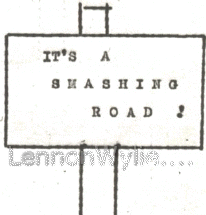
PHASE
II
During the short period at Ikingi there was an opportunity to straighten
out many little problems which had been allowed to lapse during the
retreat, as a matter of fact, it was high time the Company was given a
chance to become one piece for a while so that a stocktaking could be
held and any deficit in men, vehicles and equipment could be made up.
Replacements of any description were not to be had just for the asking,
unfortunately, and we had to make do for the most part with what we had.
Never once since that day we left Tahag had the Company been brought up
to strength, never were we less than 25 men deficient, often it mounted
to 60 and 70, harder and more continual work was required from everyone
during the latter periods.
Raids were fairly frequent in the area and one of them cost us three
good chaps - Drvs. Rees, McKean and Brookes. Three Jerry fighters
made a hit and run raid, each of them dropped two light bombs and one
pair exploded right in the centre of the bivouac area, the three lads
never knew what happened and Jerry was away almost before anyone had
realised it. The O.C. was lucky, he was driving past at the time
and the blast gave his car a shake up. The C.S.M. was seen to win
a snake race with a comrade, to comparative safety under a vehicle.
On the 2nd July 13 Corps Grouped Workshops opened up again, this time
successfully, and one of our workshops sections joined the Group in
Amyria - much to their delight. Amyria meant less discomfort, less
regimentation and much more frequent trips to Alex. As a matter of
policy, however, Workshops made every effort to impress on H.Q., not
being an egg of recent vintage listened with strong mental reservations.
Work continued at high pressure, the vehicles got no respite and it was
only through judicious shuffling of the drivers that any of them got a
half day off for relaxation, letter writing, dhobi-ing and the
etceteras.
Came the first omen, we moved to a point about five miles South of Burg
Al Arab and at first glance the new area looked a pleasant enough place,
as much as any desert location can be pleasant. It turned out to
be definitely unpleasant. Flies, we were used to, lots of them,
but there they moved in clouds and they were dirty, unwholesome looking
specimens. Added to that we had apparently picked on the homeland
of all beetles. The sand dunes which had at first attracted us
from the point of view of cover for the vehicles and the digging of deep
dug-outs, proved to be honeycombed with beetle runs. Every hill
housed thousands, all black, some small, but mostly big ones about
three-quarters of an inch long. At night it gave the occupants of
a bivouac or tent the creeps to listen to them scrabbling about,
there was nowhere they didn't get to, and what made it worse was the
knowledge that, living in sin with the beetles were a multitude of
scorpions, also black. It may be taken for granted that blankets
were thoroughly searched in those days.
We were still within easy reach of Alex., just about one hour and
three-quarters in a 3-tonner, so the day trips continued whenever the
men could be spared. The pressure of work was, if anything,
increased, the battle position was static. It was a case of first
ready first blow. Jerry was doing his best to smash up our
railheads at Burg El Arab, and Bahig and air-raids were constant.
But he couldn't stop the preparations. He was also catching a cold
himself. The R.A.F. was now showing up in numbers; instead of
ducking every time a 'plane was heard, we looked to see whose it was
first. Our bombers, in particular the "Imperturbable
Eighteen" were making regular sorties all day and every day, much
to our delight. It did one's heart good to see the day of Jerry
air ascendancy pass.
13 Corps Grouped Workshops had now moved from Amyria and were situated a
little North of Burg El Arab, near the coast, and they received their
full share of the bombing. Our Section was lucky, we only lost one
man who was wounded by machine-gun bullets.
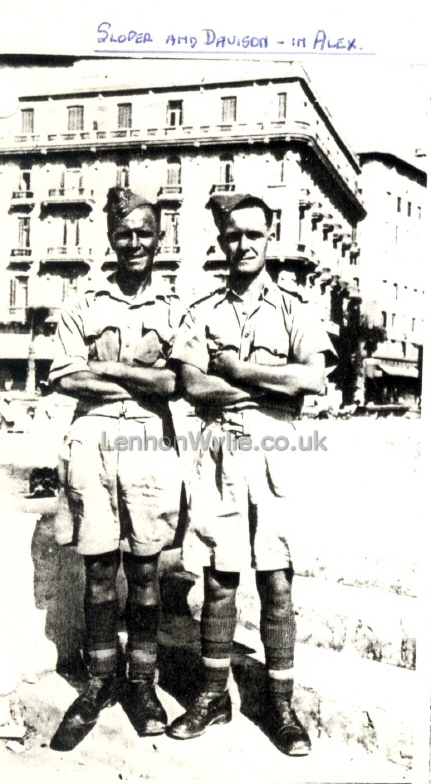
The unwholesome nature of our location was doing what all the hard work
and bad living conditions had failed to do, the sick parade was, for us,
enormous. Twenty-five to thirty men were reporting sick every day,
the trouble was, in most cases, the malignant "desert sore".
Fortunately the Company Medical Orderly was an efficient man and no-one
lacked for treatment. To combat the epidemic, the O.C. instituted
a Rest Camp in the vicinity of Grouped Workshops, on the coast, and the
worst cases were sent there to recover. One unfortunate occurrence
marred the duration of the Rest Camp, a Fitter, Pte. Earthy, was drowned
in sight of, but beyond the reach of help from his comrades. Apart
from this incident the Camp was a pronounced success, The cleaner
surroundings, swimming, and pure air soon overcame the ill-health of
those who visited it.
There was a great deal of precaution taken at this time against the
probability of enemy parachutists, the result of this was that there was
much night duty for everyone. All night patrols of armed personnel
in light trucks and "Standing to" for an hour at dusk and dawn
for the whole Company. No period of the day was so heartily cursed
as dawn.
Period leave opened up again in August and there was a rush to go.
A couple of hours' journey to civilisation is one thing, but a long,
uncomfortable ride in a goods train lasting two or three days is
another, particularly when trains are a regular target for aircraft.
These had been the conditions when leave was last open, and for that
reason, nobody was very anxious to go.
We remained in this location all through August, trying all the time to
keep up a hundred per cent availability of vehicles which is far more
difficult than it sounds. In September we again moved forward,
leaving 2 L. of C. at the same time.
On the 9th and 10th September, we took up our new position in the
central sector of the Alamein Line and about 25 miles behind. Our
new Formation was the 44th Infantry Division.
This Div. immediately bombarded us with Bumph. However, at the
cost of much strenuous effort and recrimination amongst ourselves, we
kept out heads just above the surface. The work with the Div. was
much easier than it had been with the L. of C., and everyone got a
chance to relax a little. This, combined with the fact that leave
was still open, and that some reinforcements had arrived, make it much
easier for all.
Whilst in this command we clicked for a couple of nasty little jobs
about which those who took part boasted freely. In each case it
meant driving up as close to the line as possible under cover of dark
and beneath the noses of Jerry's guns. If he had heard the
vehicles, quantities of blotting paper and a fleet of recovery vehicles
would have been necessary to clean up the landscape. The first
time the job was taking in an Infantry Battalion who were going to make
a surprise assault, and the second was bringing them out again.
Funnily enough, the infantry thought that riding in vehicles was too
bloody dangerous, and spent the time in looking for aircraft and
minefields.
Certainly air action was constant; there were dog fights overhead every
day, but the Luftwaffe were becoming very circumspect and were adepts at
evading the issue.
We actually had a concert in our location - 30 or 40 miles in the
desert. Admittedly the women looked suspiciously big of bicep and
blue of chin. However, we were not unduly critical and when the
contralto inadvertently burst out in a mellow baritone, everyone gave
her a hand!
Some thoughtless Orderly Room clerk came very near to a sticky end one
day when he addressed us as the Greek R.A.S.C. Company. At this
time our main job was supplying the Greek Brigade which was in the line
in this sector. They had no transport so we filled in and actually
got on very well with them in spite of language difficulties.
On the 14th October, we left the 44th and joined the 50th Div. which was
a move of just a few miles. We were all perfectly happy about this
because the 50th was an old friend, tried and true. If any
balloons went up we would surely be in the midst. Incidentally,
the miles of Bumph ceased to unwind and we were able to have a big fire
and breathe again. The reason for our move was that the Greeks had
moved over and so our duties were more or less the same.
* 50 Div. (Tyne/Tees) Bob Lintons's Lot!
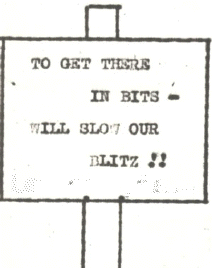
At this time the Company was just a
year old and eleven months of the twelve had been spent in the
"Field" without a break. Feelings about a break were
mixed. A few would have liked to fall back for a refit, but the
many were for keeping in the game and going through with Eighth Army.
Jerry made an unsuccessful attempt to break through, but he got near
enough to it. Every Unit in the area had to get cracking and dig
lines of defence - and how the lads loved a shovel!
Expectancy and confidence were part of every day life now. One
reason for this was that we were being told what was going on.
This was the new policy instituted so that the whole Army would be aware
of the position from day to day. The information we had been given
in this way gave confidence and pointed to an imminent eruption from our
side.
On the 23rd we were told, "Tonight at 2300 hrs. is zero hour".
So at last these endless weeks of preparation were to bear fruit.
Dead on 2300 hrs. it started. The gun flashes lit the sky almost
continuously - what a tremendous barrage it was. The bombers were
roaring overhead - undoubtedly Jerry was getting a considerable dose of
hell. Now was the time to see if he could take a dose of his own
medicine!
Next day the prisoners started coming back. The vehicles were
working in a constant circuit, supplies etc., up and prisoners down.
The prisoners looked far from arrogant. Our bombers and artillery
had blasted their dreams of splendour in the Delta; the enemy were on
the run and they didn't like it. His only hope now was to save the
remnants of his army, and that was going to be some considerable task.
On the 6th November we moved forward a few more miles to El Agur Tomb,
just another of those graves which are scattered about in the desert.
Actually, it was only an H.Q. and W.S. move, the Platoons were out and
before they returned, we had moved again. This time we moved on
the 8th to El Imayid. There, every possible vehicle was loaded and
on the 9th we were off again. This was a bigger move, no stop
until we had passed El Daba - there was left little standing there.
We had left 50 Div. (or vice versa) and 2 L. of C. had us in hand again.
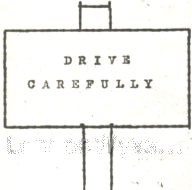
At El Daba we lost Major (not the O.C.), he was a ?yard pup that we had
picked up in November '41, when he was the size of a kitten, just a ball
of pure white fluff. brought up perforce, on bully and biscuits
and luxuries when they were to be had. (He had wonderfully
beseeching eyes when he wished and would beguile you out of your
breakfast before you had realised it) All his early life was spent
in the Sgts. Mess and when he grew up woe betide anyone who trespassed.
He developed into a fine big dog, full of fun but with an individual
temper, friendly to everyone, except a few. They disliked him
mainly because he had the good sense to distrust them. When
pleased to see you he would laugh and do his best to talk, all the time
his whole rear would be wagging. Since the night before Alamein he
had been ill and getting worse all the time, and at El Daba we decided
that it would be kinder to shoot him, and so we did, giving him a decent
burial and erecting a cross (many a man's grave has had less in this
same desert). On the cross we wrote his epilogue:-
Just another Desert Dog
A noisy, boisterous, lovable rogue,
He hated the sight of a ruddy Wog, (Western
Oriental Gentleman !)
What more could be said of a Desert Dog?
The 13th saw us settling into yet another location on the smugglers'
Cove road at Matruh. We left 2 L. of C. once more and were now
under 14 L. of C. Time off for anything was unknown, a driver's
life was just one damned load after another.
The road, and what we saw from the road revealed pretty clearly what we
had done to Jerry, agreed that not a great deal of equipment he had left
was much good. What we hadn't destroyed with bombing and artillery
he had burnt or blown up, but he certainly had taken a lacing.
The fighting troops were going too fast for us behind. There is
always a mass of work to do when the front moves quickly, and the
further they move, the greater the job. There are no dumps
forward, every mortal item has to be brought up. Our line had
stretched from Alamein to Capuzzo, a distance of some 250 miles, in an
amazingly short time, and was still stretching. Some idea of the
amount of work there was to do can be guessed at.
Winter was now making itself felt, and the first to suffer was
"Q", who had set up his store at the foot of a small wadi.
It rained heavily and he spent the morning splashing around, knee deep,
salvaging his stores - his virulence was enough to have dried the
clothing without other help. Lots of the lads received an
impromptu bath in the downpour and there was much digging of waterways
round the bivouacs. Naturally, it didn't rain again whilst we were
there.
At last, after what had seemed an interminable interval, we moved
forward again. Nobody liked being left behind. We were
making for old stamping grounds, Capuzzo, and we had to make it in one
day which isn't quite as easy as it sounds for a Company in convoy with
lots of traffic on the one and only road. It was the 22nd when we
pulled out of Matruh, the running as far as Sidi Barrini was
comparatively good. The H.D. (Highland Division) was on the road
during the stretch to Sollum and that didn't help matters at all.
In their opinion everything else should have got off the road to let
them through. As it was we were at our destination when they were
still messing about at the foot of Sollum pass. Ridetto Capuzzo
had never amounted to much, but when we passed this time it was
practically non-existent except in name. This applied equally to
most towns and villages from Daba to Tobruk. They had been fought
over, through and for so often that it was a wonder any of them existed
at all.
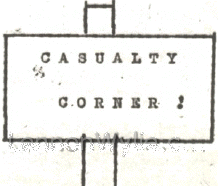
One of our officers had gone on in advance to recce our new location and
as we ran through Capuzzo just on dusk he met us and gave explicit
instructions for finding the camp area. Many blasphemous miles
were covered that night before everyone bedded down, some lucky ones in
the area, many not, but all in one mind!
This stay at Capuzzo was notable for nothing except the continuation of
work. Tobruk and back ceaselessly and we lost the "Q" to
hospital with fever, when we were at a loss to distinguish the various
types of 'planes we saw. You see, if "Q" said "That
is a Blenheim", well, a Blenheim it was and who were you to argue
with one of Wavell's thirty thousand?
We were having much less trouble from Jerry's air force. His raids
were now of the hit and run variety, mostly run.
On the 29th we arrived in Tobruk and settled just a couple of miles past
our old location at Happy Valley. Tobruk had changed very little -
one or two more wrecks in the harbour and the buildings a little more
battered than before, not to mention a further crop of minefields.
Also there were heaps of Jerry and Italian equipment about, both
captured and abandoned, and the apparently endless stream of prisoners
was to be seen as it had been all the way from Alamein.
Out turn round was now the longest yet - six days - Tobruk to Benghazi
and back load. There was no time for dawdling, but fortunately it
was road work and not desert hacks? Half-a-day in camp and away
again, and the half-day wasn't a holiday. The vehicles had to be
maintained and repaired, bath day, wash day, pay day, and every other
kind of day all had to be crammed into it. Rations, water, petrol
etc. all had to be carried for the full journey, so what with one thing
and another there was no time for day-dreaming.
On the 5th December we moved to Acroma, a matter of just a few miles,
but the move made no difference to our jobs, it was only made for
convenience.
The weather was cold and not particularly pleasant.
It was here we acquired another dog, dubbed Pluto, and he fitted his
name in appearance, manner and even in play. He was later promoted
Sergt. for his mighty work in propagating his race; at one time the camp
was alive with miniature Plutos, one of which was so befurrowed with
wrinkles that is he had worn a hat it would have been screwed on.
Papa Pluto formed a deep attachment for the O.C. and one was seldom seen
without the other. Incidentally, the O.C. got his promotion in the
normal manner!
We, once again, bade farewell to Tobruk on the 14th December, but this
time it was Westwards and not another kick in the pants Eastwards.
The weather continued to be unpleasant and we were becoming quite used
to rain, though on the morning of the 15th our indifference to it was
not conspicuous. We had parked for the night near Martuba and in
the morning practically every vehicle was bogged and it took all of four
hours to get on to the road - mostly by man-handling. It rained
all the time, and by lunch time everybody had exhausted their knowledge
of invective.
A short run, a dry billet and a rum issue cleared the air, however, and
we had all this at del Martino which was out parking place on the night
of the 15th. On the 16th we made Benghazi and located 10 kilos
West of the town. Benghazi was a disappointment to those who
hadn't already seen it. It is just the usual mixture of European
and Arab, inhabited almost solely by the latter, well battered by
bombing and strafing, and if deprived of its port facilities would have
little reason for existence.
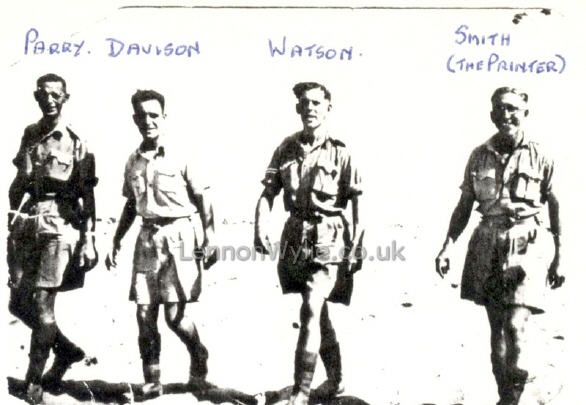
What we had so far seen of the much vaunted Italian Empire had little to
commend it that wasn't furnished naturally by the country. The
journey to Benghazi had been more than worth the discomfort we suffered
from the rain. The various passes provide magnificent scenery, and
these is an abundance of agricultural land in the valleys from Derna to
Barce. This land is all allotted in sections to the Italian
settlers, each section complete with house, and each house combines
human habitation with the stables, piggeries, hen-runs etc., all in one.
Benghazi was now the Army's main sea and road head and the next step was
to establish a new road head forward, therefore, there was no time lost
in continuing work and during our stay in Benghazi we worked on a
gradually extending turn-around. Agedabia first, then on to
Aghiela, Nufilia and lastly to Sultan. The dirty weather continued
and the roads were greasy and dangerous, particularly as the traffic on
the one road was very heavy.
Once again we were located on the edge of a 'drome and Jerry's
"fly-by-night" visits to it and the harbour were regular.
He also had a go at the convoys every time he had the idea that it was
safe, but we saw so many of our own now that Jerry's raids were no
longer taken seriously.
Christmas came around again whilst we were still at this location.
This time the necessary flesh for dinner was "acquired" -
mutton from the Arab flocks - it would be foolish to 'find' a sheep dead
from gunshot wounds and leave it to rot! Such was the faith of the
men in the E.F.I., and, of course, just to be awkward, pork was issued
from both official and E.F.I. sources. Imagine our amazement at
this feat on the part of the latter. They didn't however,
completely ruin their reputation - there was no Xmas pudding - though
faithfully every year we see pictures (in papers, etc.) of buxom lassies
putting the two million and umpteenth Xmas Pudding in the pot, but who
the hell is it that gets the bellyache from them?
As ever, the lads produced liquor where there was none and Xmas went
with a whoop. The favourite sport among the seniors this year
appeared to be the throwing of one another and others through cook-shack
windows - and their efficiency or inefficiency was evident from the look
at those who were victims! * The Pay Corporal and his friend from
Aberdeen were frequent callers at every bivouac where there was a
bottle. The owner of the latter viewed it and their approach with
consternation, to think of escape was futile. They knew of the
bottle and would track it down, no matter how craftily it was concealed.
* pay Corporal - Johnny Watson
On the night of the 25th it rained and rained and then rained some more.
Few, if any, escaped a thorough soaking, not only of themselves, but of
everything they possessed. At almost any time during that night,
forlorn and bedraggles figures were to be seen searching for
non-existent dry places and in the morning there was a great deal of
paddling and fishing for kit. One officer was the proud possessor
of much dry clothing, to wit:- one pair of gum-boots, one pair of K.D.
Shorts; one pullover (Canary yellow); one hat, and a raincoat which he
dare not take off - the pullover would have sent everyone into hysterics
any day, never mind on the bilious 26th December.
Another gentleman suffered a mysterious accident which necessitated the
use of a stick for many days - they said he fell down a slit trench in
the dark - I wonder! And why did his drawers have to be scrubbed
next morning?
The location was now a quagmire so we moved on the 29th to another site
seventeen kilos Westwards, and this camp was only better because it
hadn't been cut up by vehicles, but that didn't last long. New
Year and a percentage of Scots; little more need be said except that by
the look of certain bivouacs, a hand to hand battle would have been a
more likely description than first footing.
The question of the day was "Is it really true that the sisters
only came for a nice hot bath and dinner?". The batman
couldn't or wouldn't give a direct answer, however, your mind is your
own, clean or dirty.
The 17th January, 1943, saw us moving again, this time just four kilos
Eastwards and across the road. We were given twelve days' rest,
three days' leave to Derna for the men and as thorough a check up for
the vehicles as possible. This was the first break from work we
had had since leaving Tahag in '41.
Naturally there was something behind it all and the end of February saw
us on the line ready to go, and very pleased about it too. We were
once again a long way behind and ready and anxious to get on.
The weather was much better now. The rainy spell had passed and
though still fairly cold it was much more pleasant. During this
period NAAFI supplies were becoming more and more scarce, fags,
chocolate and tinned fruit which were the only rations in the luxury
which we had, were cut to a ridiculous proportion, even necessities were
affected. One issue a week at the most, two razor blades per man
and a cake of soap between five, least seven to a tube of toothpaste,
and so on; even then there were no serious grumbles. Everyone was
too keen to get on with the war for that sort of thing.
Air raids were unusual now. It was obvious that Jerry had
his hands full with other commitments.
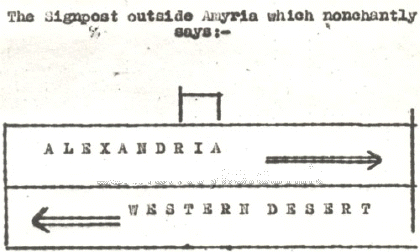
Ten Corps was moving up to take part in the final phase of the African
campaign and our job was to carry the famous fiftieth Div. The
destination was beyond Tripoli - the Mareth Line. That journey for
such a convoy (we were only a small part of it) meant ten days on the
move, with each step worked out precisely so that each unit of that huge
convoy maintained its proper position from hour to hour and day to day.
This move commenced on the 1st march, and as usual at an ungodly hour.
It was a trip full of interest too, for one thing we were carrying a
famous fighting division and would probably take them right into the
line, for another, the places we would pass through were by now
historical. For instance, Aghiela which had been in the furthest
point reached by a previous push, Agedabia, that name has suffered so
much mispronounciation, and Tripoli, the heart of the Italian Empire and
the goal of every general who had commanded the Desert Army, not to
mention an underlying hope that the Eighth would be the first in Tunis,
the Company not too far behind.
The first five days were uneventful, usually less than 100 miles a day,
the shortness of the run was for the benefit of the enemy. Apart
from sights of interest like "Marble Arch" and the now
ordinary signs of successful battle, the journey was more or less
monotonous. The first night we stayed about 50 kilos East of
Agedabia, East of Mersa Brega the second, and 6 West of Nufilia the
third. The fourth and fifth were passed 12 kilos West of Sultan
and 10 East of Sirte, respectively.
On the sixth night, happenings at the front caused a speed up, and we
cut off into the desert South of Buerat and except for a lunch stop
there were no halts till midnight. The run that day was marked by
hanging clouds of dust, heat and fatigue for the drivers, and intense
discomfort for the infantry who could do nothing but endure. When
we did stop that night, we found ourselves in a lane through a minefield
and didn't dare move very far from the vehicles. A happy thing
after driving about five hours in darkness to reflect on the short cuts
you had taken and the circuits you had made to avoid this and that.
We were now just a few miles South-East of Zlinten and a day's journey
in advance of schedule.
The seventh day saw us back on the road and we made Castel Benito
(principal Italian air base in North Africa) for the evening halt.
Tripoli was at last in sight and everyone was looking forward to seeing
it next day as we passed through. However, we didn't move next
day, which was just as well. The vehicles needed maintenance and a
few were in need of major repairs. Apparently the need for rushing
these troops forward no longer existed and the move reverted to
schedule.
On the 8th March we moved to Olivetta on the coast West of Tripoli and
much to everyone's disgust we by-passed Tripoli and only got a glimpse
of it from a distance. Zarzis was the ultimate destination, it was
reached on the 10th and now we were hoping that the Company would remain
under command of 50 Div. rather than go back to L. of C. duties.
As usual, however, our wishes and hopes were of no avail, for the next
fortnight we were shunted from here to there and from Div. to Div.,
Fiftieth, Highland and Fourth Indian. We worked with them all and
liked it except for the fact that we never knew who was our boss for two
days running. The work during this period consisted almost solely
of troop carrying, taking them into and out of the Mareth Line with
Jerry rendering an accompaniment of shells, bombs, and machine gun fire,
whilst our own artillery threw wagon loads of ammo over our heads.
At times like that a lorry feels as big as the Houses of Parliament and
the Infantry lads cursed the trucks feelingly for attracting Jerry's
attention. Needless to say, whenever we received an order to get
out, it required no repetition!
Our locations were all in the Zarzia-Medinine area. We left Zarzis
on the 18th March and located about 35 kilos from Medinine. On the
19th we moved to a point 17 kilos North East of Medinine, and on the
20th we hung up our hats two kilos East of Medinine.
We also expended much energy in digging slit trenched everywhere we went
and in one place outsize ones for the vehicles. We had just
finished these when we moved again. It was little to be wondered
at that the men looked a bit rabid when they were given a shovel, to
spend hours digging, reaping meanwhile a harvest of blisters and aches,
then to move suddenly and know that it is all to be done again in the
next location isn't conducive to content.
On the 27th we were ordered back to L. of C. duties much to everyone's
disgust. This meant another move and backwards this time. So
back we went and pitched camp 17 Kilos West of Ben Gardane. Our
work then consisted of continuous convoys up to Medinine and Gabes
carrying forward load upon load of supplies from an apparently
inexhaustible source.
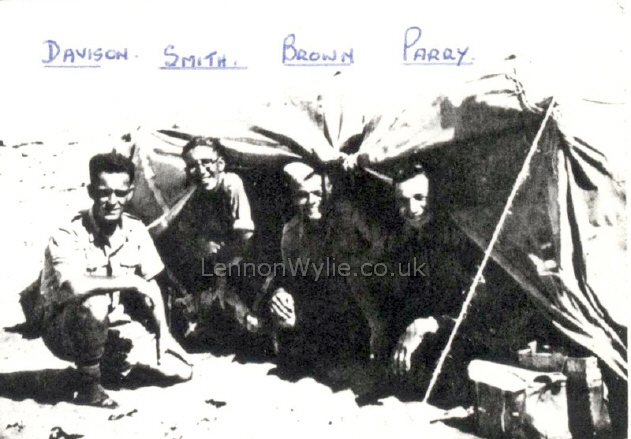
The fall of Sfax to the Eighth on the 10th April, heralded another move
for us. Such successes meant the opening of new forward dumps and
new dumps meant plenty of work for the Corps stocking them up. But
first the old road-head must be cleared and so some Companies go forward
and others stay behind to clear up. This time we stayed and it was
the 23rd April before we moved up to the new road-head at Gabes and
started work running from there to Sfax.
There was no doubt in anyone's mind that the war in North Africa was as
good as over. It was just a case of how soon, and would Monty beat
the "British" and American armies into Tunis. How
everyone hoped that he would. It would be a fine subject to crow
over the First Army lads about (British).
The only occurrence likely to cause comment during our stay at Gabes was
a serious attach of sign painting. We could have given the H.D.
points on it at this time. Wherever you went in the camp there
were signs, multi-coloured, ordering you to do this, that, or not to do
the other, and there was always someone ready to spring out at you with
a lurid query as to the state of your eyes, to state that you were
dazzled by the display was to ask for trouble.
H.D. - Highland Division
Our stay at Gabes was short. The rapid advance of the Army didn't
make for prolonged halts. On the 2nd May we passed through and
made camp a few miles West of Sfax, and were we glad we passed through!
The sanitary arrangements had been busted by bombing, and the
odour.....! Our new location, however, was very pleasant, grass
and trees - what a welcome sight they were to our eyes after the
monotonous miles of desert we had come through. Since entering
Tunisia there had been another difference, besides the inevitable Arab,
there were now Europeans, French colonists in all the towns, and there
was much polishing of rusty French in the hope of getting our feet
"under the table" as the saying goes.
The civilians were short of many things and if anyone had a supply of
tea, sugar or cigarettes etc., there was a fortune to be made. As
it was, the Western Oriental Gentlemen !
were making it. They bartered eggs and fresh vegetables for
everything down to Army biscuits, and then sold the proceeds at
exorbitant prices. If they couldn't get what they wanted by
bartering or buying, they weren't averse to stealing.
The N.A.A.F.I. issues had not improved all this time and cigarettes were
touch and go all the while. But now we were in touch with the
First Army and some supplies were sent to us from them. Imagine
our feelings when we discovered that their supplies were much better
than ours. Home produced chocolate, cigarettes, boot polish, etc.,
whilst we had been getting inferior goods made in Egypt or Palestine and
paying through the nose to fill the coffers of the Egyptians who, you
may be sure, clapped a very heavy duty on imports for the troops.
Perhaps they didn't want Jerry kept out.....!
That it saved shipping space and exploited local possibilities was all
very well, but it didn't take the bad taste out of the mouth of the man
in the ranks.
Our vehicles were running from Sfax to Le Kep and Le Krib, and the
greatest trouble we had then was tyre replacements. Our tyres were
by no means new and the heavy loads and long runs on bad roads were
causing havoc. There was a continuous job repairing blow-outs,
punctures and exchanging old for new, coupled with exhortations to be as
sparing as possible in demands for new ones.
The enemy had by now shot his bolt and the daily report of advances and
successes, the number of prisoners taken and so forth was heard with
delight, and when the 12th of May came and passed and the campaign was
over, we all felt grand, but everyone had the same thought; "Where
and what next?".
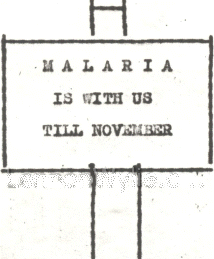
PHASE
III
Although the 12th May was a mile-stone in the prosecution of the war,
and marked the completion of one stroke against the enemy, it did not
mean that everyone downed tools and had a nice holiday. Transport,
in particular had to carry on ferrying a vast amount of supplies
forward.
We of course were waiting impatiently for orders. It was only a
question of how soon and where. The suspense was not unduly long;
on the 20th we moved back to Tripoli, and there the vehicles were given
a quick 'once-over' and then loaded to capacity with salvage which we
were to take back, our destination being the Nile Delta, counting from
Sfax, a distance of approximately 1,400 miles.
Though it was a long way for one trip, we weren't at all worried, a few
hundred miles meant little to us in those days and in addition we looked
forward to having a look at the various places which had been in our
speech daily for years. Besides, leave in the Delta promised to be
more satisfying than leave in Tunisia, though we would have given a
great deal to have been able to visit Tunis and like places.
On the 26th May, we set off from Tripoli and everyone more or less
settled back to make the best of the long trip. The first stage
consisted of a hop to Benghazi, staging at Misurata, Buerat, Sultan and
Agedabia, arriving at Benghazi on the 30th May.
This first stage was notable for nothing except the monotony and the
consistent breaking down of the Company Office vehicle at hourly
intervals. One individual riding on it was most strongly accused
of being a 'hoodoo' and burning at the stake was nothing to the things
he was threatened with if he didn't move. After each breakdown the
hatches were battened down and safety belts fastened prior to passing
everything on the road in the wake of a trio of motor cyclists, and then
arrive in position, the old tub panting but triumphant, until in a
matter of minutes the whole procedure was repeated.
We were allowed a couple of days at Benghazi for maintenance and
repairs. Workshops took the opportunity to make a full scale
attack on the Office waggon. Washing clothes, seeing the town
again and speculating on leave filled our spare time.
On the 2nd of June we set off again and it immediately became evident
that Workshops attack on the Office vehicle had been a failure - it
broke down in the first five miles. The C.S.M. who was riding on
it and hadn't dirtied his lilywhite hands for years, now stank of petrol
and look rabid if anyone so much as breathed the word
"breakdown".
The night of the 2nd we stayed at Narana, and here we had sore trouble.
The vegetation was as dry as tinder and the slightest spark started a
fire which spread with alarming rapidity. We had four outbreaks
within an hour of halting but by dint of hard work quelled each one
before any harm was done. It was hard and hot work and was
conducive to murder to extinguish one fire, turn round, and see some
bloody fool 'brewing up' a couple of hundred yards away.
Next morning we moved on and throughout the day's journey there were
fires to be seen blazing away on both sides of the road. There
were thousands of locusts about the road, some still at the hopping
stage, and others flying. We parked the night just East of Derna.
This time we found a spot which had already been burnt out. On
three sides of this area big fires were burning, but our only danger was
from sparks which might land on a vehicle, so we were able to bed down a
little easier in mind that on the previous night.
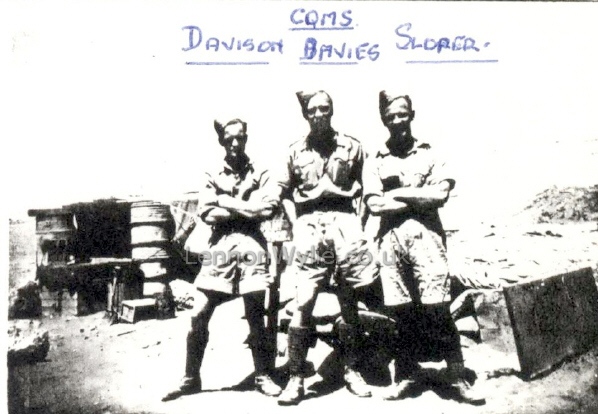
On the morning of the 4th we continued the trek with Derna soon left
behind. Derna, more or less, divides the desert and cultivation,
though the change is actually gradual and spread over many miles.
Monotony was the order of the day except for a great deal of speculation
caused by the amount of war material on the road, all going west.
We staged that night in Tobruk, almost exactly in the same area that had
been our camp on our first visit in '41, which is quite a coincidence
when there is all that desert to chooses from. There was little if
any change - the same sunken ships, battered buildings and ground
littered with wreckage of every description.
The night of the 5th we staged at Buq Buq, just East of Sidi Barrani,
and on the 6th at Matruh. One good day's driving and we would be
within striking distance of civilisation, which we knew would merely
mean being at the tender mercies of a multitude of rapacious Egyptians
and sundry other nationalities of both sexes, one being different from
other only by the degree of exhortation used.
Amyria, 25 kilos from Alexandria was our staging point on the 7th, and
we stayed all the 8th to get rid of our loads of salvage and do some
repairs and maintenance.
Being at last so close to relaxation the lads were as full of expectancy
as the bride who said Grace before retiring! Alex was painted a
delicate shade of crimson that night and day.
We halted the night of the 9th in the lee of the Pyramids at Mena, and
the bars in Cairo resounded with the boastings of a small band of
'desert rats'.
Our ultimate destination, Tahag, we reached about mid-day on the 10th
June. We knew that here we would be subjected to a course of
'bull', intensive, but, we hoped, not extended.
Leave opened, and were we pleased. After 22 months in the field we
were generously presented with four days' leave, which included
travelling time. Long hoarded supplies of cash were brought out
and swiftly found its way into the bottomless pockets of our ally, the Western
Oriental Gentlemen !.
Tahag didn't fail us, we got full bore, training courses, spit and
polish, guards, inoculations, vaccinations (no exaltation) and in no
time a state of organised confusion reigned throughout, and not a sign
of refitting, though by the sounds of revelry from the Officers' and
Sgts. Messes, a complete refit was needed there.
On the 27th June leave was cancelled, and on the 28th we got a transport
job which took us to Suez. There we parked on a strip of white
sand and were left to grill for three days, then on July 1st we were off
again, this time to Amyria, which was much better, being near to Alex.
We set up camp and got to work, the only fly in the ointment was that we
knew we had to go back to Tahag before we could hope to get over the
water.
Half days in Alex were fairly frequent and there were plenty of concerts
about, so everyone was happy.
On the 17th the O.C. was posted to another Unit. We were all sorry
to see him go. He had been with the Unit since its formation and
was well liked.
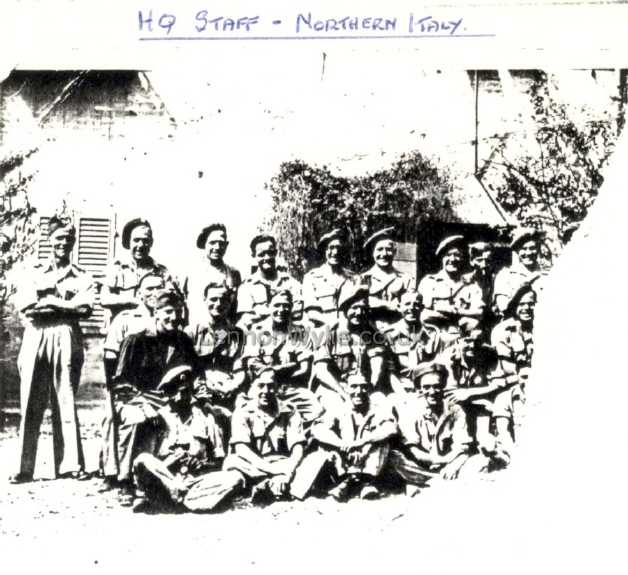
We wended our way back to Tahag on the 29th July, and took up our
training programmes, etc., where we had left off, and then commenced to
refit with reconditioned vehicles. The general consensus of
opinion was that we would have been better off if they had given us the
necessary spares to repair our own vehicles which we could then have
kept. Perhaps that opinion was wrong.
Those who hadn't had leave now got off, though most of them had, by this
time, got through their accumulation of cash. Thos factor
curtailed their activities somewhat, and relieved the C.M.Ps. of some
work.
As soon as the refit was completed we expected to be off again.
But no. Time dragged on and everybody got thoroughly 'browned
off', except perhaps the "Tahag Stallion" and a few of his
comfreres. (confreres?)
In this period we lost another officer who was very popular. After
a farewell party at the Sgts. Mess he visited the O.C. in the grey hours
of morning, completely oblivious of the fact that he had lost his pants
at the party! His exit was rapid, if undignified!
Towards the end of August things began to happen and the strength of the
Unit in Tahag gradually shrank, until, on September 7th, Company H.Q.
moved to Amyria again, this time preparatory to embarking. We took
a poor view of moving by rail. We were much too used to having our
own transport and going our own way to appreciate the doubtful comforts
of the Egyptian State Railway.
At Amyria we lost our new O.C. We began to look on him as a Will
o' the Wisp. In the short time he had been with us he had been on
one course, once on leave, and this was his second time in hospital.
It got so that each morning it was necessary to ask his batman if he was
still with us.
On the 13th September we embarked, and we had to get up at an ungodly
hour to do it. The thought of getting another step on our way, however,
made it worth while.
The closely guarded secret of where we were to disembark was known to
all in a matter of hours, don't ask how. It happens time and time
again and nobody the wiser.
The trip was entirely uneventful except that we saw a part of the
invincible (previously invisible) Italian Navy on its way to Alex, its
role somewhat different to that originally intended by Mussolini.
Our ship was rechristened by the overwhelming vote of the troops, to the
"Altmark", at least, that is the only printable name out of
the many suggested. We called at Malta, but had to be content with
what we could see from the ship. There was no shore leave.
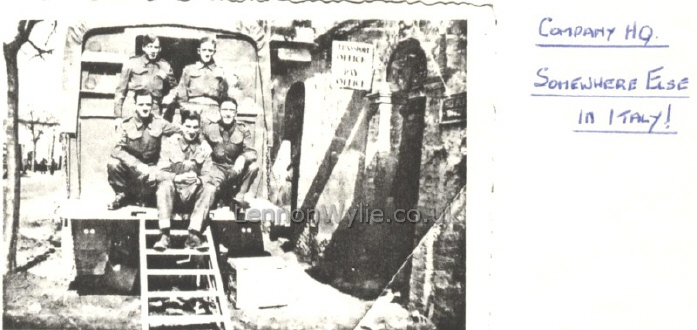
On the 20th, we once again got up in the middle of the night in order
that we should not be late for disembarkation at 0900 hours. After
the normal hurry-scurry was over and everyone was ready, we had time to
contemplate the Sicilian coastline and get our first view of Syracuse.
When we disembarked, we were overjoyed to see some of our own vehicles
waiting for us, and soon we were on our way to the Company location.
This location was only a few miles out of Syracuse, and for the first
time in the Company's history we had green fields for a camp site, not
to mention trees, winding lanes and scattered farmhouses.
Work here was confined to local details and the reassembling of the
Company as it arrived piece by piece from the M.E.F. Meantime
friendly relations were established with the local inhabitants, and if
you want to know how to conduct a conversation with a foreigner whose
language you don't understand, ask a "Tommy". The lingo
never stopped him yet. Naturally the local wines (Vino) got a bit
of a lacing, and the fruit and nuts which were then in season were
consumed in huge quantities. We soon found that lire went much
further than piastres.
The O.C. joined us from M.E.F. just about the time the weather was
breaking with the coming of winter, and within a few days we moved into
Syracuse and took over the Sports Stadium as a billet. It took the
whole of two days to make it habitable, and even then the lads didn't
like it because there was a nice big wall around it with a massive gate
which was closed each night, which meant that their nocturnal activities
were a good deal hampered. Of course, a few had unofficial exits
which they fondly imagined were unknown to the powers that be.
Having a football pitch as a front yard we got in quite a bit of sport.
Once we played a Company of the Black Watch and beat them, that was only
part of the story. They apparently received a questionable
reception on returning to their Unit, because next morning they appeared
with several changes in their team and determined expressions.
They demanded a return match on the spot and then proceeded to lick us
to the tune of six to nil, and departed happy in their regained honour.
After that we decided that it was time we left the country, and on the
16th October, we crept out of Syracuse at dawn with the intention, we
hoped, of rejoining the Eighth Army at long last. We passed
through Catania and got a good view of the famous or infamous Mount Etna
as we passed round its base.
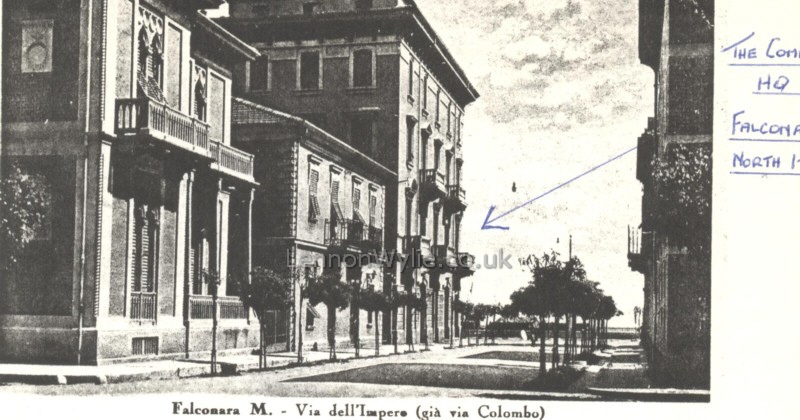
THE COMPANY HQ FALCONARA
After the usual convoy lunch we continued on our way and eventually
arrived in Messina long after dusk. There was little we could so
that night except have our evening meal and get into kip. The
vehicles were so closely parked that it was difficult to get between
them. However, it didn't matter, as the only nocturnal visitors
were people begging for food. They were equally willing to steal
it and the sentries had to keep a sharp eye on them.
The 17th, reveille in the small hours, breakfast, and off to the docks,
where, in due season (!) we were loaded on to invasion barges and sailed
smoothly across the straits of Reggio, there to reassemble and continue
our journey.
We were soon given a first hand introduction to that part of Italy - the
"toe" - mountains and then more mountains. That day, the
next and most of the third were the same. The weather was fine,
and when not actually at the wheel, everyone had leisure to enjoy a
striking trip. The road was quite good at first, but deteriorated
on the second day and it wound - how it wound, up and up the mountains,
hairpin bends and sweeping curves, corners that took good driving to get
the vehicles round in one sweep, and gradients that made good brakes a
matter for thankfulness. The engines roared and strained, but took
us over with little trouble. Villages cling to these steep sides,
some perched on the very top of solitary pinnacles. The sight of
them made you wonder what toil must have been necessary to get the
materials up. The villages and the villagers are poor, very poor;
there was little sign of Bonito's much vaunted prosperity. In one
direction he has been assiduously obeyed, the children, in this matter
there is evidence of much homework. Every village swarms with
them, packed away each night, each family in a couple of rooms,
irrespective of age or sex.
They thronged the streets and set up a perfect babble, the theme always
the same, biscuits, chocolate, or cigarettes, and a hectic scramble
there was for any thrown. Amongst them all there was hardly one
whose clothes hadn't a smattering of patches, and most could give Joseph
and his coat points.
We travelled along the North coast of the "Toe" and the sea
was in sight most of the time. Scores of Italian soldiers were on
the road making their was home, the hard way and damned lucky to be
allowed to creepaway so lightly; after all their back-stabbing they were
in the clear.
The third day we left the mountains behind and came down to the coast on
the other side of the "Toe" and made our way through flat,
well formed country, to Taranto. The rags were becoming less
evident, and the begging less determined.
Taranto is another battle-scarred seaport, occupied by the Allies, who,
in their lighter moments, continue the education of that renowned fleet
- the Italian Navy. The fact that the personnel of the Italian
Fleet are allowed full freedom to strut about as they wish, us in
itself, evidence of their complete futility.
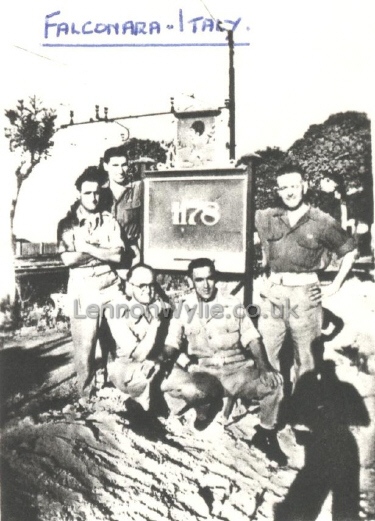
On the 21st October we set off for Barletts, via Bari, on the East
coast. This short trip was remarkable for nothing except that we
reached our destination by lunch-time.
We spent the remainder of the day getting settled, unpacking and getting
ready for work. Things were not quite so simple, however. We
received orders to move again at first light on the following morning.
This time we were bound for Foggia which was only two or three hours
away. What a location it turned out to be! Up to that day we
thought we knew pretty well all there was to know about locations, good,
bad, or indifferent. This was one in a class all alone.
Foggia has been almost entirely destroyed by bombing. Buildings,
bridges, railways, trains and roads had been most thoroughly blitzed,
even the cemetery had been bombed and we were parked around it.
Admittedly there was a wall between, but that didn't stop either the
odour or the creeps attacking, especially at night. The sentries
in particular appreciated it !! The officers declare that a
spectre came in and made a fourth at bridge with them! We wondered
whether it was pink or green. Fortunately we were not there for
long - just a few jobs and we moved a little further forward.
Our next move was to Lucera, and was carried out on the 24th October.
It was another short run, and we were located by mid-day in a camp which
suited us much better, out in the country in a well-wooded area.
Here we had room to spread out. We were not yet used to being
cramped into streets and billets, and having been used to plenty of room
took rather badly to being crowded. There were no billets, but the
weather was still fairly decent, so there wasn't much hardship to that.
Work was now plentiful and the Company soon settled down and got into
its stride once more. This was really the first time since we had
left Egypt. The work for the drivers was hard and constant, they
were seldom in camp more than two or three hours and the roads they used
called for continual alertness and plenty of work on the wheel, but that
was what they thrived on.
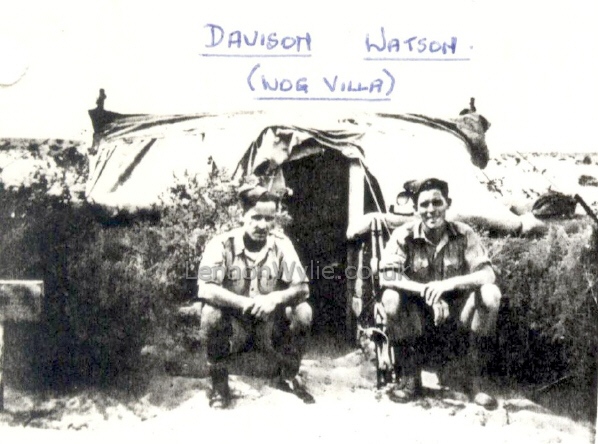
We remained in this camp until the weather became too bad and the tracks
into and out of the camp became almost impassable. Then we had to
find billets in Lucera. We already had one place there which had
been used so far as a club and recreation rooms. At this place it
was possible to procure a particularly deadly brand of Vino, a veritable
'devil's brew'. In the finish, the boys wouldn't drink it, even
though they could get nothing else. The chap in charge of the
Canteen despaired of ever selling it. He did eventually sell it,
however, and to the Officers' Miss, with the assertion that it would be
mother's milk to them.
The billets in the town were at last found, and on the 27th
November we moved in. H.Q. had a gymnasium attached to their
billet, and the Entertainments Officer immediately suffered under a rush
of brains. And so did we! We had basket ball and then more
basket ball, a little boxing, a whist drive which the Canadians won -
for once the twisters were twisted. Also there was an Italian
professor laid on to teach Italian. He, poor fellow, was amazed to
find that he knew more English than his pupils, and couldn't understand
why we said "Come on" when we meant "Go Away".
The Platoons had a monastery as a billet, but as temporary tenants they
did no penance except to scrub it frequently.
We often wondered in those days if we should be lucky and have decent
billets for Christmas. We had a hope that we would be able to hang
on to our present billets over the festive season, but on the night of
11th December, we moved out, and dawn the following day saw us on the
beach at Vasto - yes, the bloody beach. We travelled up and down
the desert for nearly two years hoping always for a location near the
sea - and now we had one - in the middle of winter! The journey
had been bad, mud, outsize pot-holes, vehicles bogged and slipping off
the road. Were we happy that a.m.? Strange though it may
seem, we were!
Here we stayed for the next five days whilst the officers scoured the
country for billets. We watched our chances of a decent Xmas
receding rapidly.
We had recently sent two N.C.O.s off to take commissions, and now we got
word that they were missing, presumed lost at sea. So we lost Sgt.
L. Sharpe and L/Cpl. Philipson.
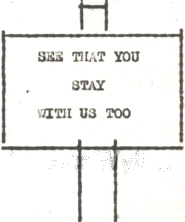
On the 18th December we finally moved, this time into a small village,
Villelfoncina by name, and found to our delight that we were the only
troops in it. The delight came after we had got used to its
apparent squalor. This turned out to be mostly outward. The
people proved to be both friendly and hospitable. Everyone settled
down nicely, and not a few got their feet under the table. In
spite of all this moving about work went on just the same, and there had
been no let up on the quantity of it to be done, though the conditions
were a lot worse owing to the weather. The roads were terrible and
often well nigh impassable. One of our N.C.O.s was highly
commended for getting a convoy of bread through to the forward troops in
time for their Xmas breakfast. Nobody would or could have blamed
him if he had failed.
Christmas preparations went ahead now that we had a billet, and the
women of the village were greatly intrigued by the sight of our cooks
making cakes and mince-pies etc. They watched for hours and made a
point of coming back to see the finished article.
Probably the least said about Xmas Day, the better, but it went off very
well. The food was excellent and plentiful. Beer and whisky
was strictly rationed, but there was plenty of Vino in the village, so
the customary hilarity wasn't lacking. Boxing Day saw the usual
quota of furry tongues and pounding heads and the Sergeant Major was
giving spurious excuses for having his arm in a sling. Numerous
others had bumps, and bruises too, even the O.C. - he tried the express
method of descending the stairs and wasn't seen for some days.
The bulk of the Company now waited in some trepidation for the small
percentage of Scots amongst us to bring in the New Year in their own
traditional fashion. Fireworks of a brilliant hue were expected.
The trouble was that no-one could forecast in which direction they would
fly. The Scots meantime were wangling all they knew so as to be
free on the 31st, at the same time unearthing hoarded bottles in
anticipation.
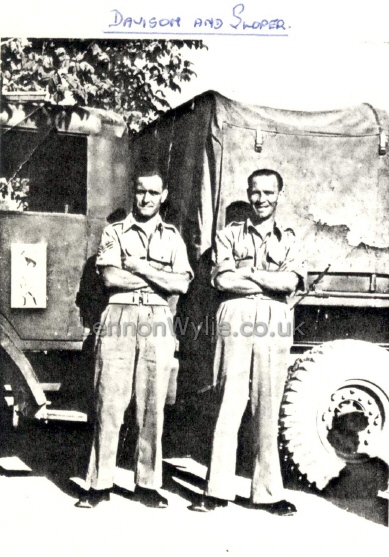
T.
E. F.
There is still a tale told by the hoary veterans of the Unit, an
antiquated annal dug from the haziest recesses of memory, and tendered
wishfully to a generally sceptical audience, of how one of our officers
leading a convoy got hopelessly lost in the Egyptian Desert. (Yes!
Yes! incredible, but true) He had to call on an L. of C.
Headquarters to ask the whereabouts of 384. And the classic reply
was - "Never heard of them!"
This is told merely to illustrate that the Unit's present far-flung fame
was not gained easily, but emerged gradually as a result of honest
endeavour and sterling achievement. Today, at any Headquarters, be
it L. of C., Divisional, Corps or Army, a request for the Unit location
will invariably elicit the reply - "That bloody shower! Ten miles
down the road, turn right, and four miles down an impassable cart track,
then two miles through an impenetrable wood, and you'll find them at the
top of a nearly mountain. And you might ask the Major what the
hell he's supposed to be doing there!"
The same respect for the Unit's reputation is evinced by the Officers
and the men of the Unit. Witness a recent conversation in the
men's canteen - "The officers - what a bloody shower!"
And one in the Officers' Mess - "The fellows - what a bloody
shower!" The N.C.Os dare not venture an opinion either way,
but both officers and men sum up their integrity and valour with -
N.C.O.S, "I've s--- 'em!" Such is the good will and
lovable sincerity that pervade the unit.
Although the fame of the Unit has been won mainly by the men at the
wheel, it must be noted that the wheels within, including the officers,
of course, are pretty well oiled. The administration is excellent
in its way, its complete lack of system lending it a colourful gaiety
that no other Unit could hope to achieve. The pay system has
recently won the attention of the War Office. This feat has
stilled a long-held suspicion that the powers that be assumed the Unit
to be part of Tito's guerillas. The C.S.M. fulfills no useful
function as yet, but a store is gradually being built up of sundry
discarded garments, which should eventually fetch a fair amount of hooch
from the natives. The Transport Office, a recent innovation, gives
the Unit a definite air, and the Officer 1/c has an extensive library of
novels.
Words cannot do justice to our Workshops.
The 384, the Jockey Club - the SHOWER - it typifies the spirit of the
British Army, the Glorious Tradition carried on in miniature. Only
the Sergt. Major is unhappy, as the O.C. stalks past followed by a
tenuous whisper - "Who's winning?"
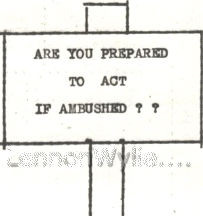
TRUTH
A. Lieut. was admitted to hospital and whilst convalescing he was given
a bundle of mail to censor. Having made his mark on each, he
returned the bundle to the office and inwardly rejoiced. Later in
the day, the Commanding Officer approached him and said, "You are a
very clever man, Mr. Skippitt". Now that type of compliment
was most unusual as far as Mr. Skippitt was concerned and he dithered,
made baby noises and broke out in a sweat. "You can read five
or six different languages", continued the Colonel. This
confounded poor Skippitt completely and reduced him to incoherent
gibbering, for, be it said, he had enough to do to command English.
The Colonel being human, could rejoice inwardly as well as the next, now
fired his last salvo, "The letters you have just censored, Mr.
Skippitt", said he, "were written in French, Polish, Greek,
Maltese, etc., you were given the Base Censor's bundle by
mistake!!"
"Our Atlantic convoys continue to prey successfully on the
U-boats."
"Can I have the afternoon off, please. You see, Grandma is
coming home on leave!"
A story is told of an interview the Quartermaster had with the O.C.
The former is in no position to deny it!
O.C.:
"You were drunk last night".
"Q":
"Yes, Sir".
O.C.:
"You never reached your quarters".
"Q":
"No, Sir".
O.C.:
"You spent the night on the salvage dump in the next camp".
"Q":
"Yes, Sir".
O.C.:
"Disgusting, Quartermaster, disgusting. In future ensure that
you use our salvage dump!"
In a postscript to a letter in which he had made some large requests to
Santa Claus, a little boy wrote "If you can't handle this deal, let
me know, and I'll get on touch with Henry Kaiser!"
When smacking a customer's face with a haddock, the fish should be held
by the tail.
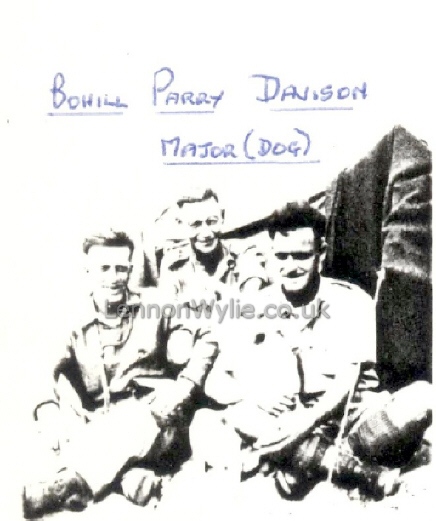 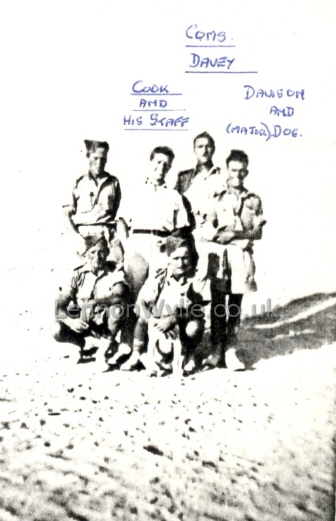
|